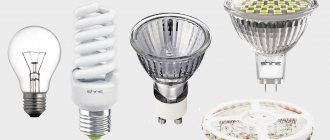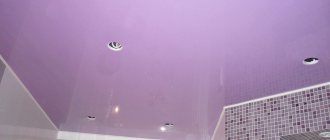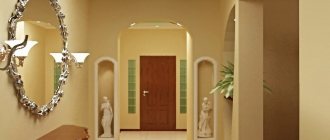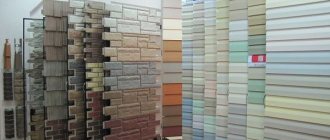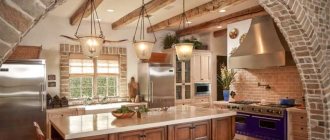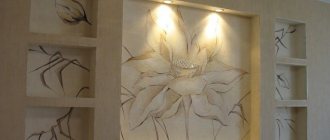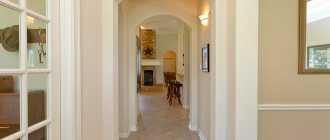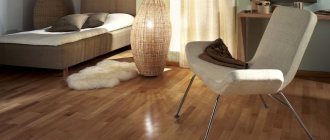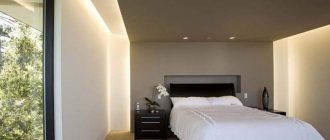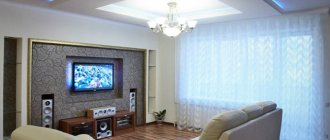Properly installed PVC sheets will ensure their correct operation for many years. However, completely different factors influence how they fit into your interior. Among them, in the first place is the competent organization of lighting, on which the overall atmosphere in the room and the visual harmony perceived in it often depend. Basic diagrams and photos with examples from interiors will help you, which will help you achieve the optimal location of spotlights on a suspended ceiling.
- Spot location rules
- Spot layouts with a chandelier
- Spot layouts without a chandelier
- Options for placing lamps in different rooms
- Conclusion
Installation specialists call these lamps differently: mortise, spot
, spotlights, spotlights, recessed and so on. However, the essence does not change - in many ways, they play the main role in creating a unique lighting scenario in a room, helping to emphasize certain areas.
In light of such popularity of spotlights, many have somehow completely forgotten that their original purpose is to serve as additional lighting in the living space, where the chandelier located in the center rules the roost .
.
However, the latter is increasingly being ignored as a light source. Not in all cases this can be considered justified, but often constructing a light pattern in a room exclusively with the help of spots can be considered successful.
Lamps for suspended ceilings
Location Features
Types of devices
Lamps used
Installation of ceiling models
Location: photos and diagrams
Lighting options
Lamps not only perform the function of lighting, but also decorate the room, giving it uniqueness and special comfort. When choosing lighting fixtures, take into account the general idea of the design, as well as the features of the surface to which they will be attached. Lighting in a kitchen with a suspended ceiling has its own nuances, which we will consider in the article.
Photo: Instagram @prinesibobra
Photo: Instagram @deluxe_od.com.ua
Photo: Instagram @migcomservice
Spot layouts without a chandelier
In a number of rooms, spotlights take on the main role in organizing lighting due to the lack of possibilities for installing a central chandelier. Also, the latter can often look like a foreign element in certain interiors, for example, in a narrow corridor or a small bathroom. In cases where the use of a chandelier is inappropriate, the correct placement of spot spots on a stretch ceiling takes on additional importance.
The most common options for using spots in such cases are discussed in detail in the diagram below.
Again, this is what it looks like in a variety of interiors.
Features of the location of lamps in a kitchen with a suspended ceiling
When choosing lighting, you need to take into account the features of stretch fabrics. They are made from PVC film or fabric. With constant heating above 60 degrees, the film may darken and melt. The fabric is more stable and can withstand temperatures up to 80 degrees. It is advised to adhere to several rules:
- choose lighting fixtures that do not heat up too much;
- choose incandescent lamps with a power of up to 60 W, and halogen lamps with a power of up to 30 W, while it is important to maintain a distance from the lighting fixture to the panel. It must be at least 30 cm;
- If possible, use LED and energy-saving varieties, since they hardly heat up during use.
Photo: Instagram @prinesibobra
Photo: Instagram @prinesibobra
Photo: Instagram @migcomservice
- Lighting
How to choose a chandelier for your interior: options for 8 popular styles
Advantages and disadvantages
Positive and negative qualities of products that will help you understand whether this lighting method is beneficial.
Advantages
- Due to their compactness, they fit perfectly into the design of any room in an apartment or house.
- Can be used both as main and additional lighting.
- They allow you to achieve zoning of space and provide light to individual areas.
- By using spotlights with LEDs or halogen bulbs, energy costs are reduced.
- This type of lighting is characterized by an unlimited choice of installation locations. The products can decorate any area, niche, arch, etc.
Due to models with spectacular decor, it is possible to advantageously emphasize the style of the interior.
Lamps with warm or cool shades can create a comfortable atmosphere in the room and give the design a certain mood, depending on individual preferences.
Flaws
- Surface-mounted and recessed lighting fixtures have some installation difficulties and require a professionally designed installation diagram.
- For products with 12 Volt light bulbs, the purchase of a special step-down transformer is required.
- Some types of light sources require a ceiling with a special design.
Types of lighting fixtures
Based on their design, lighting fixtures are divided into four groups.
Chandeliers
They are still in demand, despite the emergence of more modern accessories. Manufacturers offer a good selection of models: from classically shaped lampshades to designer options made from unusual materials. To prevent the stretched panel from heating up, it is better to choose designs whose shades look down or to the side. It should be taken into account that the glossy surface reflects light. Therefore, chandeliers with shades will look good here. For film material, the distance to the heating zone is critical, so it is better to choose a longer chandelier suspension.
Photo: Instagram @_marina_ky
Photo: Instagram @_marina_ky
Photo: Instagram @_marina_ky
Spot
They are at the peak of popularity, which is not surprising: they do not heat up, have different mounting options, are durable and simply beautiful. Since the kitchen is often humid, it is better to choose models with a moisture-proof housing. To obtain bright or diffused light, you can choose transparent or frosted glass, respectively. And with the help of colored glass you can create unusual patterns on the surface. During installation, you can make electrical wiring to turn on the lights only in the areas needed at the moment. To calculate the required number of spotlights, you need to know the generally accepted lighting standard. It is 20 W per 1 sq.m of room.
Photo: Instagram @vgceiling
Photo: Instagram @mix_svet
Photo: Instagram @migcomservice
Spots
A variety of point models that are not built into the ceiling surface, but are attached to it or to the walls on a movable bracket. Due to their mobility, they create a directed beam of light. The control controller helps you adjust the intensity of the glow. These types are good for zoning a room, illuminating the desired part of it, or focusing attention on interior details. Spots can be single or complex, with several cartridges on one platform. If the spot itself is rather ascetic in appearance, then the platform can become an interior decoration.
Photo: Instagram @mix_svet
Photo: Instagram @prinesibobra
LED strips
The design looks like a flexible printed tape on which small LEDs, white or colored, are attached. Such ribbons run around the perimeter of the room, visually increasing its area. The reverse side of the tape is sticky, so it is easy to attach. The tape is connected to the network via a power supply. And controllers are used to control the brightness of the glow.
Photo: Instagram @migcomservice
Photo: Instagram @horizon_line_krd
- Lighting
9 ways to make your home more comfortable with LED strips
Photo examples of interesting options
Here are some successful lighting design solutions for various types of premises. Examples will include both standard schemes and original compositions.
For the corridor and hallway
In such rooms there is no need for bright lighting, therefore, there is no need to install a central chandelier. The sources are installed along the walls or along the entire perimeter; if there are mirrors, it is advisable to additionally illuminate them using wall lamps.
Classic corridor lighting scheme, suitable for almost any interior
Below is a similar option, but with a central chandelier.
Option with central chandelier
If the corridor is narrow, then place spotlights in the middle, creating a light path; if necessary, you can make additional lower lighting on the walls, as shown below.
An example of a light path laid along the center of the ceiling in a narrow room
A similar arrangement is also possible on a multi-level ceiling, as can be seen from the figure; this version is more original.
Multi-level stretch ceiling with light track
If the corridor has a glossy stretch ceiling, then upward-facing soffits look good as additional lighting. Their rays reflected in the ceiling will create an interesting play of light.
The use of flashlights (spotlights) for additional lighting
Lamps on a suspended ceiling do not have to be installed at equal distances from each other; the asymmetrical design looks quite original.
Asymmetrical hallway lighting scheme
For small square hallways, we can recommend a classic scheme for 5 lamps. It is shown in Figure 1 (A), and the chandelier can be replaced with a ceiling lamp.
For kitchens
This type of room is rightfully considered the brightest; it is problematic to prepare food in the twilight, in particular, cutting vegetables. Therefore, proper kitchen lighting needs to be given special attention. This is greatly facilitated by the division of the room into zones, in one there is cooking, in the other there is a dining table, etc. In such cases, lamps are installed in accordance with the interior, room layout and level of natural light.
Of the typical options in Figure 1, schemes “I” and “K” are best suited for such purposes.
Example of implementation of scheme I for 10 lamps
Option “K” is more suitable for spacious rooms.
Example of scheme "K"
It is not at all necessary to use the above schemes; you can find other solutions, the main thing is that there is enough light in the work area.
The kitchen work area should always be well lit
It is equally important that the lamps are also directed towards the dining table, as shown in the example below.
The dining table is located under the central chandelier
It is not at all necessary to use a hanging chandelier; if the spots are positioned correctly, you can do without it.
Kitchen lighting without a pendant chandelier
Below is another version of a “chandelier-less” scheme for a kitchen with a ceiling panel.
Solution for multi-level stretch ceiling
For the hall
This is the largest room in the house, and since it is considered the main room, it should correspond to this status. For large areas, the classic scheme with the main lamp in the form of a pendant chandelier and additional illumination of areas may not be effective. In such cases, it is better to use a uniform arrangement of lamps on a stretch ceiling.
Uniform lighting of the hall
As an alternative, you can consider schemes with uneven placement of lamps on the ceiling. In such cases, spots can be concentrated in different parts of the room, creating zonality.
Example: Uneven placement of luminaires
This method of placement is perfect for studio apartments, which essentially consist of one large hall. With the correct placement of spots, a large room can easily be divided into several zones.
Example of zoning in a studio apartment
A good option would be to install several lamps on the ceiling in an oval, while the figure can be divided into several segments that can be switched on separately.
Lamps can be arranged in the form of geometric shapes
Solutions with multi-level suspended ceilings on which spots are installed look good.
Illumination of a hall with a multi-level ceiling
When choosing a scheme, be sure to take into account the interior design, since choosing a different solution will require major renovation work.
Light scheme creates zonality
For the bedroom
In fact, this room is a continuous recreation area, therefore, it is necessary to maintain moderate lighting.
Light in the bedroom should be moderate
If there is not enough light, you can always install additional sources in the form of a sconce or floor lamp.
If necessary, you can install a sconce or floor lamp near the bed
If we consider classic schemes (see Fig. 1), we recommend paying attention to two options “E” (8 lamps) and “H” (12 lamps). A small pendant chandelier framed by several LED strip figures also looks good.
Chandelier, LED strips and several spotlights
You can choose an option with imitation of the starry sky; an example of the implementation is presented below.
Grouped small sources for a starry sky effect
Please note that the interior can also influence lighting. Light reflected from the drapery acquires its shade. This is clearly visible in Figure 24, where ordinary “warm” white light lamps are used to illuminate the room. The interior adds red undertones.
An example of the influence of the interior on lighting
There are no restrictions on your imagination; you can create something fabulous and unusual.
Bedroom lighting in a futuristic style
For living rooms
This type of room differs from a hall in its smaller area, so it is better to use schemes with a central powerful source (chandelier) in the middle of the room with additional spots. The latter can be located around the perimeter or highlight the corners of the room. If we consider the classic options (see Fig. 1), then we can choose the following schemes: A, C, D, F, G, J and L. Each of them fully satisfies the conditions of the problem.
An example of classic lighting according to the “C” scheme
Moreover, the perimeter does not have to have the correct shape; the absence of right angles creates a completely different mood.
Interesting lighting solution around the perimeter
There is no need to install lighting above the seating area; it can be successfully replaced by sconces.
Sconce in the recreation area
In the living room, as in the hall, you can completely abandon hanging chandeliers if you use several powerful lamps with an outdoor location.
Oval made from outdoor light sources
An LED strip in a multi-level plasterboard ceiling will cope with lighting the living room no worse than a chandelier.
Lighting scheme using built-in lamps and LED strip
If the living room is small, it is enough to just install spots around the perimeter.
Classic scheme without chandelier
For children's room
As a rule, such rooms are zoned for sleeping, studying and a play area. Accordingly, a group of additional lamps should be installed on the suspended ceiling above the table, and sconces should be placed near the cribs.
It is necessary to install sconces in the sleeping area
Alternatively, a table lamp can be installed on the desk.
Table lamp as an additional light source
Since a children's room is often a playground, a chandelier in the room is not desirable. If children play too much, they can damage it. Uniform placement of powerful spots allows you to do without a bulky chandelier.
It is better not to install a hanging chandelier in the nursery
Proper lighting will help create a bright, fairy-tale atmosphere in the nursery.
The correct scheme will fill stretch ceilings with photo printing with colors. Photo wallpaper will take on a more realistic look.
Multi-colored lighting will create the illusion of a fairy tale
For the bathroom
Since in standard panel houses this room is not large in size, you can opt for option “B” with 6 lamps (see Fig. 1). For such a situation, it is not even necessary to implement the entire scheme; it is enough to choose one of two types of lamps for the ceiling. If necessary, you can install sconces or rotating lamps near the mirrors.
One of the simplest bathroom lighting options
If the bathroom is larger, then the scope for imagination expands significantly. You can use the classic version with evenly spaced spots.
Evenly spaced bathroom fixtures
Light can emphasize zoning.
Zoning using light
Another option for emphasizing zoning
Use a technique to give the light the desired shade.
Due to the color of the tiles and stretch ceiling, the light is given a light green tint
Option with a warm blue tint
Lamps used for lighting in the kitchen with a suspended ceiling
When choosing spotlights, you need to think about what lamps will be used in them. In our case, the following types are used.
- Incandescent lamps (base E27, E14) are loved by buyers despite other, more modern varieties. They provide a warm light that is pleasant to the eye, do not flicker, and are inexpensive. A serious disadvantage is their rapid and strong heating. Therefore, for pendant models, light bulbs with a power of up to 60 W are chosen. For built-in ones, it is better to choose other types.
- Halogen lamps are a more modern type of incandescent lamp. They shine brighter and last longer, but they cost more. Halogen lamps emit a light spectrum close to daylight. However, they also get very hot. For PVC canvases, it is recommended to choose lamps with a power no higher than 35 W.
- Luminescent ones do not heat up, therefore, they can be safely used next to film sheets. They can create both cold and warm radiation. This allows you to select a shade suitable for the interior. Energy-saving lamps are more expensive than incandescent lamps, but they consume five times less energy and last longer.
- LEDs are the leaders in all respects. They do not heat up, consume little energy, are bright and durable. Their glow spectrum is similar to daylight, and their small size allows them to be used in any design. The only negative is the rather high price compared to other types.
Adjustment type
All of the above types of spotlights can also differ in the type of adjustment. Depending on this, spotlights are:
- non-rotating – illuminate part of the room, but the direction of the light flow cannot be adjusted;
- rotating - allow you to adjust the angle of incidence of light and its direction;
- rotating and retractable spotlights are used to change lighting zones.
In terms of functional features, spotlights can also vary significantly.
Modern models are equipped with remote control, have a wider angle of light incidence, protection against dust and moisture, and other functions.
Installation of ceiling lamps
Based on the shape of the structure and type of installation, they can be divided into three groups.
Hanging
Mounted on a hook in the ceiling. The chandelier has fasteners with which the structure is suspended. When installing, a hole is made in the canvas through which the suspension is pulled. It is recommended to choose large chandeliers for spacious rooms, while respecting the chosen interior style. Particular attention should be paid to the length of the fastening. Between the main ceiling and the stretched ceiling there is a space that will hide part of the suspension. It is important that the device is not too close to the stretched fabric.
Photo: Instagram @prinesibobra
Photo: Instagram @prinesibobra
Built-in
They consist of a housing, a light bulb with a diffuser and a mount. The housing is completely or partially recessed (built-in) into the ceiling plane. Its shape can be round, square or rectangular. There are models that illuminate only the space underneath (they are called downlights) and those that rotate in different planes, changing the direction of the beam.
Photo: Instagram @vgceiling
Photo: Instagram @swg_ru
The appearance of the device can be chosen to suit your taste: flat or with a convex shade in the form of a cone, ball, polygon or cylinder.
Photo: Instagram @zdes_svet
Photo: Instagram @zdes_svet
Photo: Instagram @zdes_svet
Photo: Instagram @zdes_svet
Overlay rings are decorated with pendants or decorative patterns. The models are ideal for illuminating a two-level upper structure. This way you can select one level or all at once.
Photo: Instagram @zdes_svet
Photo: Instagram @zdes_svet
Photo: Instagram @zdes_svet
Photo: Instagram @zdes_svet
Invoices
Installed using a platform on the ceiling canvas. The main selection criterion is lightness. Most often this type is represented by LED models. They are lightweight, yet they shine brightly and do not heat up. The design of their lampshades is varied. The platform can be stylized to resemble precious metals.
Photo: Instagram @divine_light.ru
Photo: Instagram @prinesibobra
Photo: Instagram @e.okna
- Lighting
How to remove a spotlight from a suspended ceiling and replace it with a new one
Device features and benefits of use
Spotlights got their name due to the small size of the lamp and the external effect of radiation from a single point.
The lamp is enclosed in a shade; hence the main feature of the spots: the light dispersion angle does not exceed 30°, and the light flux itself has the shape of a cone. A small angle allows you to illuminate a limited part of the space, so for uniform lighting, use a group of spots with a fairly dense arrangement.
The steady demand for spot lighting is explained by the following benefits of use:
- Spots are practically invisible and therefore adapt to any interior. Small ceiling lamps are hidden under the surface when installed and therefore do not burden the space.
- You can choose spots for any style. Some models allow you to adjust the direction of the light, which increases their design capabilities.
- You can evenly illuminate any room. A chandelier does not always cope with this task, but well-placed spots on the ceiling will easily solve the problem.
- You can organize partial lighting of the room, and thereby significantly save electricity.
Installation instructions
Installation of spotlights in suspended ceilings begins with laying electrical wiring along the base ceiling. This is done before installing the tension structure. After completing the work, mark the areas where the lamps will be located. Build fasteners for them in advance. After installing the ceiling, make cuts in the marked places, install thermal rings that will not allow it to tear further. Pass the wires and connect the light sources at the end of the work.
Choosing the location of lamps is a process that requires the implementation of certain recommendations, compliance with electrical and fire safety rules and a creative approach.
Summing up
Properly designed lighting is not only effective, but in some cases an effective design tool. The variety of light sources allows talented owners of apartments and houses to create real works of art or entire pictures of light and shadows.
Unique ceiling lighting
You just need to understand a little about the correct dispersion of the light flux and choose the most suitable lamps for a certain type of room. And then you can not only enjoy high-quality light, but also visually change the size of your home, which is very important when creating a unique design.
How to choose
An important criterion when choosing lamps in the interior is their design, which is consistent with the style of the room. For a classic room, you can choose models with ornaments or crystal pendants. In a room with a modern design (modern, high-tech, loft) standard white lamps of a simple shape are suitable.
In addition to the appearance and material of the lampshade (it can be glass or acrylic), when choosing, pay attention to the following details:
- Design. If the ability to change the angle of light is important, pay attention to rotating lamps.
- Base type (usually GU10 or LED).
- Dust and moisture protection class. Important when installing in a bathroom, open veranda or kitchen.
- Possibility of changing the type of lamp (LED instead of halogen).
- Possibility of connecting a dimmer.
Base G9
This type is in the middle in terms of efficiency and comfort. The protrusion of the bulb is much stronger, which contributes to a powerful luminescent spread. All types of lamps are developed for this format. Suitable for industrial premises, studios, workshops, photo studios, since the beam covers the entire room.
Backlight colors
A certain color or shade shapes the mood of the entire interior.
Neon
Flexible neon has a soft blue or blue glow. This cool shade looks great in both larger and smaller rooms.
Pink
Creates a magical atmosphere and incredibly beautifully envelops individual fragments of the room with magical light.
The photo shows a bedroom and a single-level gray ceiling with pink lighting.
Color (RGB)
Provides several multi-colored options that allow you to customize the ceiling model to suit any mood.
Yellow
It is a rather positive and bright interior solution.
Purple
A non-trivial option that is suitable for those who love non-standard and extravagant design.
White
The simplest, but at the same time very stylish and effective type of lighting, creating a uniform white light flux.
Review of manufacturers
There are many brands on the lighting market, whose products you can find in stores. Those who want to save money and use equipment for a long time can buy products from the following manufacturers.
Ecola. Lighting engineers emphasize the capabilities and value of this brand. The Chinese manufacturer has many positive reviews about its products. All models are equipped with a moisture protection system and are easy to install. Having top-segment qualities, they are inexpensive. Only environmentally friendly materials are used in production. The catalog contains models for any base, including table lamps. They have low heat generation, a body made of impact-resistant plastic that is not prone to temporary changes. Does not oxidize in air, does not turn black when overheated and does not emit toxic substances into the atmosphere.
Philips. A Dutch brand that focuses on practicality and minimalism. It is protected from moisture and is resistant to power surges. The Philips stretch ceiling lamp is undemanding during installation and will fit any interval between the ceiling and the film. The entire catalog has European certification and is allowed for sale by PUE and SNiP. The catalog includes flat spots and lamps with remote control. They belong to the moderately expensive segment.
Citilux. Danish manufacturer creating innovations in the lighting equipment segment. Ceiling lights for suspended ceilings "Citylux" are resistant to vibration, moisture, and mechanical damage. The products are available and have European certification. Does not require constant maintenance, easy to install. Experts are in demand for their price and environmental friendliness. Top models are equipped with flood protection. Even if there is a flood from above, there will be no short circuit inside the light bulb.
